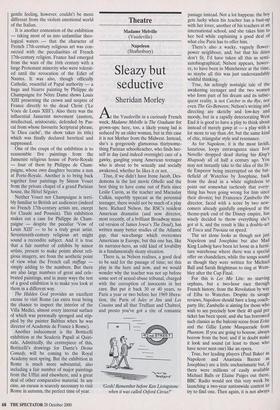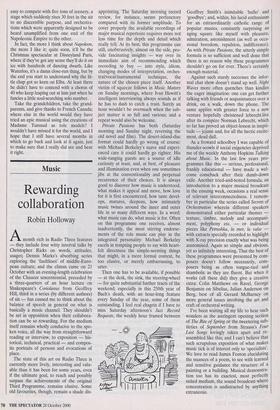Theatre
Madame Melville (Vaudeville)
Napoleon (Shaftesbury)
Sleazy but seductive
Sheridan Morley
Athe Vaudeville in a curiously French week, Madame Melville is The Graduate for grown-ups; here, too, a likely young lad is seduced by an older woman, but in this case it is not Mother from the Midwest. Instead, she's a gorgeously glamorous thirtysome- thing Parisian schoolteacher, who finds her- self in day (and indeed overnight) care of a gawky, gangling young American teenager who is about to be sexually and socially awakened, whether he likes it or not.
True, if we didn't have Irene Jacob, Des- demona in the last movie Othello and the best thing to have come out of Paris since Leslie Caron, as the teacher and Macaulay Culkin, superbly typecast as the perennial teenager, there would not be much of a play here. Richard Nelson, the RSC's resident American dramatist (and now director, most recently, of a brilliant Broadway musi- cal version of James Joyce's The Dead), has written many better studies of the Atlantic gap, that sea-change which overcomes Americans in Europe, but this one has, like its narrator-hero, an odd kind of lovabliity in a fundamentally sleazy situation.
There is, as Nelson realises, a good deal to be said for the passage of time; set this play in the here and now, and we would wonder why the teacher was not up before some sort of sexual-abuse tribunal, charged with the corruption of innocents in her care. But put it back 30 or 40 years, to Paris a year or two before her 1969 libera- tion, the Paris of Jules et Jim and Les Cousins and all that Truffaut and Chabrol, and presto you've got a rite of romantic `Gosh! Remember before Ken Livingstone when it was called Oxford Circus?' passage instead. Not a lot happens: the boy gets lucky when his teacher has a bust-up with her lover, another of his teachers at an international school, and she takes him to her bed while explaining a good deal of what else Paris has to offer him.
There's also a wacky, vaguely flower- power neighbour, and, but that his dates don't fit, I'd have taken all this as semi- autobiographical; Nelson appears, howev- er, to have been in Manchester at the time, so maybe all this was just understandably wishful thinking.
True, his achingly nostalgic tale of the awakening teenager and the two women who form part of his dream and its subse- quent reality, is not Catcher in the Rye, nor even The Go-Between; Nelson's writing and directing are sketchy and low-key and moody, but in a rapidly deteriorating West End it is good to have a play to think about instead of merely gawp at — a play with a lot more to say than Art, but the same kind of chic, triangular style and resonance.
As for Napoleon, it is the most lavish, luxurious, loopy extravaganza since Ivor Novello dropped dead during his King's Rhapsody all of half a century ago. You may not instantly take to the idea of the lit- tle Emperor being interrupted on the bat- tlefield of Waterloo by Josephine, back from the dead in a white nightdress to point out somewhat tactlessly that every- thing has been going wrong for him since their divorce; but Francesca Zambello the director, faced with a score by two new- comers already gainfully employed at the theme-park end of the Disney empire, has wisely decided to throw everything she's got at it, and the result is like a double-act of Tosca and Traviata on speed. The set alone looks as though not just Napoleon and Josephine but also Mad King Ludwig have been let loose in a furni- ture warehouse where there was a special offer on chandeliers, while the songs sound as though they were written for Michael Ball and Sarah Brightman to sing at Wem- bley after the Cup Final.
For this is Les Mis Lite: no starving orphans, but a two-hour race through French history, from the Revolution by way of Elba to Waterloo. Despite its savage reviews, Napoleon should have a long coach- party life; Zambello is aiming for those who wish to see precisely how their 40 quid per ticket has been spent, and she has borrowed such classics as the balcony scene from Evita and the Gillie Lynne Masquerade from Phantom. If you are going to borrow, always borrow from the best; and if in doubt make it look and sound (at least to those who have never seen one) like an opera. True, her leading players (Paul Baker as Napoleon and Anastasia Barzee as Josephine) are a little uncharismatic but, if there were millions of easily available Michael Balls or Elaine Paiges out there, BBC Radio would not this very week be launching a two-year nationwide contest to try to find one. Then again, it is not always easy to compete with five tons of scenery, a stage which suddenly rises 30 feet in the air to no discernible purpose, and orchestra- tions which were apparently designed to be heard unamplified from one end of the Napoleonic Empire to the other.
In fact, the more I think about Napoleon, the more I like it; quite soon, it'll be the Christmas spectacular at Disneyland Paris, where if they've got any sense they'll do it on ice with hundreds of dancing dwarfs. Like Waterloo, it's a damn close-run thing, but by the end you start to understand why the lit- tle chap got so keen on Elba. At least there he didn't have to contend with a chorus of 40 who keep leaping out at him just when he fancies a little soul-searching solo number.
Take the grandchildren, take the grand- parents, and give thanks to French Canada; where else in the world would they have tried an epic musical using the creations of Madame Tussaud as role models? I wouldn't have missed it for the world, and I hope that I still have several months in which to go back and look at it again, just to make sure that I really did see and hear it right.



























































































 Previous page
Previous page